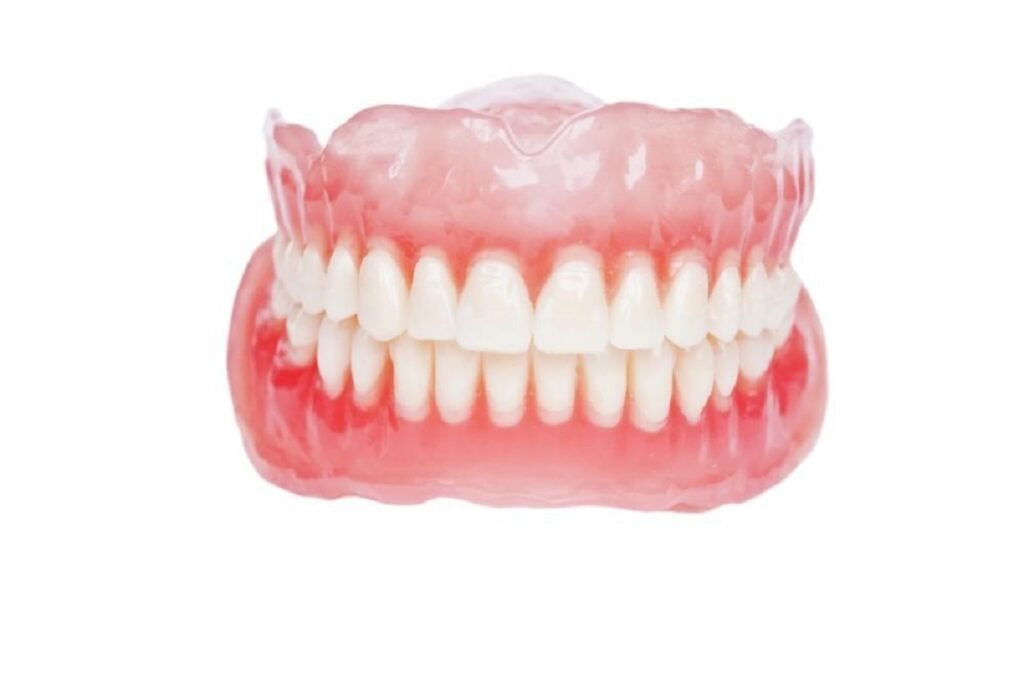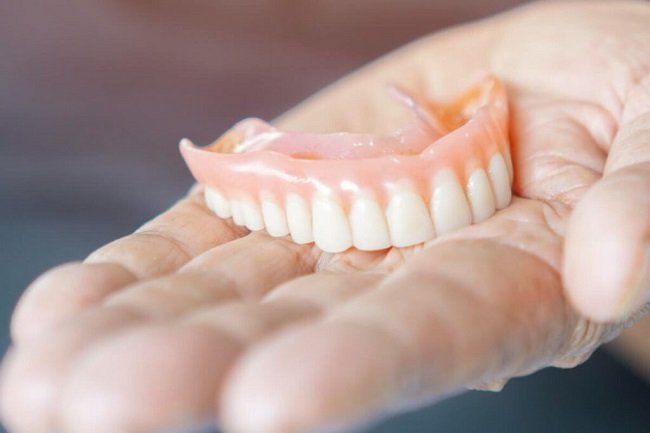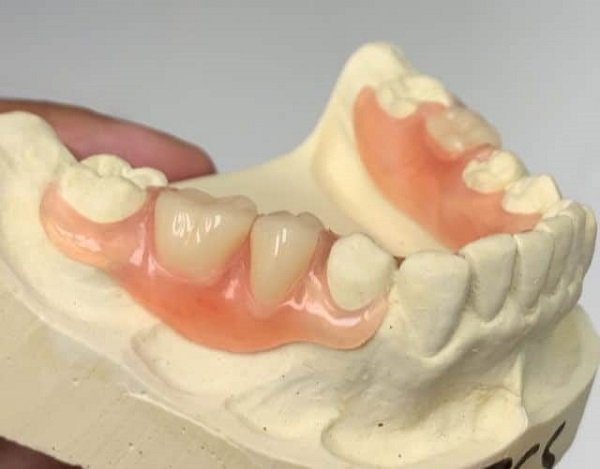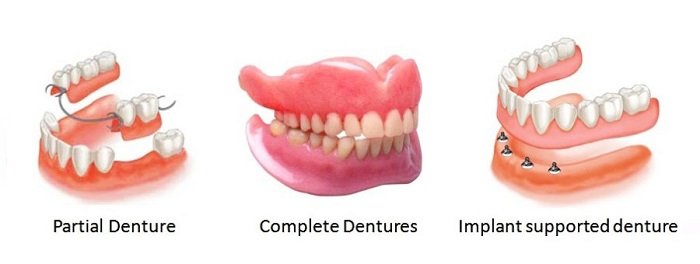What are dentures made of? The options mainly include acrylic resin, porcelain, flexible polymers, or metal alloys. Each material comes with its advantages in terms of durability, comfort, and appearance. Because of that, dental clinics avail themselves of trusted suppliers to prevent unwanted results that can lead to poor patient satisfaction, for example, Aidite. By learning a little about what dentures are made of and types of dentures and cost, patients can better appreciate their options when it comes to both oral health and restoration.

What Are Dentures Made Of?
Dentures can be made from a variety of materials, all of which provide specific benefits such as comfort, durability, and aesthetic appearance. Acrylic resin is a typical lightweight and cost-effective material, and porcelain is expensive but offers a natural appearance and resists staining.
Flexible nylon allows partial dentures to be very comfortable, while metal alloys add structural strength. In modern dentistry, composite resins and 3D-printed materials are also used. Denture materials allow the production of higher quality, long-lasting dentures designed to fit the patient’s needs. When you know what are dentures made of, you can make better decisions about your dental care.
Types of Materials Used for Dentures
As types of materials used for dentures each affect different factors like comfort, durability, price, and looks, it’s good to explore them all. The answer is, of course, relative to the needs of the individual and their budget, and one that patients often ask What are dentures made of?

Here’s a detailed look at the most common types of materials used for dentures:
1. Acrylic Resin- Low in price and Light in weight
Acrylic resin is one of the most popular and widely used denture materials. It is inexpensive, easy to handle, and very simple to modify or fix. This also makes it ideal for complete dentures and temporary partial dentures. While acrylic is the default material when dentists are searching for affordable solutions, when answering the question, what are dentures made of?
2. Keep that natural look and stain-resistant- Porcelain
Porcelain is preferred because the characteristics resemble those of a human tooth. It is also the most aesthetic option and mimics your natural enamel very well. Another benefit of porcelain is its resistance to stains. It is one of those types of materials used for dentures known for impeccable durability but is heavy and brittle, though.
3. Soft and Hypoallergenic Flexible Nylon
Flexible nylon (thermoplastic resin) is mostly used for partial dentures, is a kind of very soft and flexible material. It molds to the gums, which makes it more comfortable and less irritating. When we talk about what are the best dentures made of for sensitive patients, they are often mentioned.
4. Cobalt-Chrome Metal Alloys- Strong Skeleton
You can find these metal alloys in partial dentures due to their increased strength and thinness. These offer a low weight while remaining stable, resistant to deformation, and long-lived. When looking at the types of dentures and cost, metal-based ones may set you back more at first, but are very durable long-term.
5. Composite Resin- Aesthetic and Versatile
Composite resins are made with an appropriate combination of strength and aesthetics. They are frequently utilized in custom and implant-supported dentures because they offer both aesthetic value and high-strength properties compared to regular acrylic. Composite resin is a high-quality material, so you may consider it when thinking of what are the best dentures made of.
6. Material: 3D-Printed Resin- Exact, contemporary
Advancement in digital dentistry made 3D printed resins for denture fabrication available with high accuracy and precision. This allows for rapid production and a great fit, minimizing iterations. With the constant innovation and high-quality options from providers such as Aidite, clinics have kept a consistent quality of aesthetic result.
Patients will receive labs from a dental practice that uses Aidite materials for consistent material quality, better fit, and quality for a longer period. Being aware of the materials involved in your denture will help you choose the appropriate compromise between appearance, comfort, and durability.
How Material Choice Impacts Denture Comfort and Longevity
In choosing what dentures are made of, consider your lifestyle, oral health, and personal preference. The types of material used for dentures to create your denture will affect your comfort level, your appearance, your speech, and the longevity of the denture. Knowing what dentures are made from here is how your denture experience is affected by the various options:

- Fit and Flexibility: Flexible materials like nylon materials mold to the gum line and are much more comfortable . Stiff materials might take a few more tweaks to get a good fit.
- Weight and Bulk: While porcelain and metal options may feel heavier, acrylic is both lightweight and easy on the skin. Long-term use of bulkier dentures can irritate and sore gums.
- Wear Resistance: Unlike acrylic, porcelain and composite resin are better at withstanding wear, therefore, maintaining their form and shape longer.
- Gum Health and Sensitivity: Valplast or flexible nylon is a nonreactive material that reduces sensitivity in sore gums. Long-term use of low-quality material can cause inflammation or sores.
- Maintenance and Repairs: Acrylic is simple and cost-effective to mend or reline, which is good for the patient who may need adjustments down the road. When porcelain and metal have been damaged, they are much more difficult to adjust.
Choosing the right denture material is never a one-handed job between you and your dental provider. So knowing what dentures are made of helps you weigh the positives and negatives of every material. Utilizing advanced materials provided by manufacturers such as Aidite, dental professionals are able to provide tailored functional & esthetic solutions.
Types of dentures and cost
Current knowledge regarding the types of dentures and cost shows that the materials will determine the cost of every item. It is advisable to find an answer to the question, what are dentures made of: List of tooth replacement types includes materials that are normal for the needs of the population.

Main types include:
1. Complete Dentures (Full set)
Only used for patients with all missing teeth. The material is acrylic and porcelain, and the average cost per arch is $300-3,000.
2. Partial Dentures.
As a full set of dentures that are considered good enough to replace; they are metal, acrylic, or flexible resin. The average cost is about $400-1,800, based on design and material.
3. Implant-Supported Dentures
They are attached to dental implants. This type is made of high-quality resin, porcelain, or metal and is stable. The cost is $3,000-6,000+ and a greater lifespan.
4. Snap-In Dentures
These types are less prone to pulling out but are still removable. Their securement systems are implants or mini-dental implants. The price of these types is $1,500 to $4,000+.
5. Temporary (Immediate) Dentures
These products are designed to opera immediately and are used for replacement; the average range $300-$800. Later, salient products are used.
Partial and articulated products
- Acrylic Full Dentures: $300-1,000 per plate.
- Porcelain dentures: $1,000-3,000.
- Implant-supported: $3,000–$6,000+
The types of dentures and cost are other indicators of the laboratory’s quality. Clinics that utilize Aidite products generally offer patients better results at lower costs. When you ask what dentures are made of, you see at least in part what you pay for and why you want it to be of quality.
FAQ
Q1. If I’m allergic to acrylic, what are dentures made of?
For sensitive patients who are allergic to acrylic, dentures can be built on flexible nylon or metal materials, which are a more comfortable and safer alternative to less durable acrylic.
Q2. What material is the best for durable dentures?
Porcelain, metal frameworks, or both are likely the best dentures due to their wear-resistance, structure retention, and ability to support a strong bite for the long term.
Q3. Does denture material make a difference in cost?
Yes. However, porcelain- and metal-based dentures are relatively more durable and aesthetic but cost you higher, whereas the acrylic option is ideal for those on a budget.
Conclusion
What material is used in dentures? It involves selecting a basic balance among comfort, features, and appearance, greater than polymers or porcelain. When patients understand the types of dentures and what the best dentures are made of, along with the types of dentures and cost, they can make better-informed decisions. Lead clinics using Aidite make sure that patients are given dentures made from safe and high-quality material. Understanding what they consist of will help you with your options before receiving full, partial, or implant-supported dentures.



